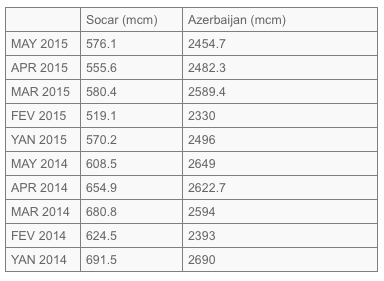Greater Caspian Region Weekly Overview - July 5th
Iran
Iran preparing gas delivery to EU by FLNG
Alireza Kameli, managing director of National Iranian Gas Exports Company told Shana on July 4th that Iran has been negotiating with the “world’s biggest company in FLNG shipping serving to transfer Iranian gas to Europe in 7 to 12 months.”
Kameli didn’t mention any names, but said that gas export would start in 7 to 12 months.
NIGEC is seeking LNG projects in the country as well while keeping an eye on FLNG projects.
Several South Pars phases developed
Phases 22, 23 and 24 of the South Pars gas field has been developed to 77.2 percent.
Operator of phases 22, 23 and 24 Farhad Izadlou also said that drilling operations have progressed by 63 percent, while the production platforms of these fields have been developed by 70 percent and expected to be launched by April 2016.
Izadlou said 11 wells have been drilled in phases 22 to 24.
The progress of Phase 19 also reached 86.6 percent. It’s expected that this phase starts early gas production in current year.
Iran needs $200 billion to decrease energy intensity by 50%
Iran needs $200 billion in order to halve energy intensity.
Nosratollah Seyfi CEO of Iran Fuel Conservation Company said that with the current pace of energy consumption growth as well as high energy intensity, Iran would become energy importer in eight years.
Natural gas shares about 70 percent of Iran’s total primary energy consumption.
According to the International Energy Agency, the energy intensity index in Iran is one of the highest in the world (twice as much as the world average) and has been increasing on average by about 3.4 percent per year over the past 40 years.
South Pars gas production reaches 440 mcm/d
Iran’s raw gas production from South Pars reached 440 million cubic meters per day (mcm/d).
The Managing Director of Pars Special Economic Energy Zone Mehdi Yousefi said that the gas production has increased by 35 percent during last 1.5 years and it’s expected to reach 800 mcm/d in coming years.
He added that 25 petrochemical units are fed by South Pars’ gas in Pars Special Economic Energy Zone.
Iran’s petrochemicals export increases by 11.59%
Iran’s petrochemical products export increased by 11.59 percent in value during first three months of current fiscal year, the Custom Administration reported.
Iran’s fiscal year starts on March 21st.
According to the report, the petrochemical products export reached 6.263 million tons with worth $3.623. The volume of petrochemicals export also increased by 24.54 percent.
Iran also exported 725,000 tons of propane (-30.69%) as well as 507,000 tons of butane (-16.62%) during this period (spring).
Azerbaijan
SOCAR drilled 53,436 meters of oil and gas wells.
The State Oil Company of Azerbaijan Republic (SOCAR) has drilled about 9,518 meters of oil and gas wells during June, while the total drilling operations during January to June reached 53,436 meters.
All of drilled wells in June were production wells, while 52,436 meters of drilled wells in first half of 2015 was productive wells.
During this period, the drilling of 35 wells were completed.
Azerbaijan gas production decreases
Azerbaijan’s gas production decreased above 0.5 bcm in the first five months of 2015, compared to the same period in last year, due to a decrease in Socar’s gas production.

Georgia increases gas intake from Azerbaijan
While Russia stopped gas import from Azerbaijan in 2015, Georgia increased gas intake from Baku by 4.5 percent in Jan-May.
According to the Georgian Statistical Committee, this country imported 712,900 tons of natural gas in oil equivalent with worth $147 million.
Kazakhstan
Kazakhstan signed an agreement to develop its offshore field.
Kazakhstan’s national oil and gas company KazMunaiGas has signed a contract for combined exploration and production on the Dead Kultuk site (Ustyurt), said the website of Kazakhstan Stock Exchange (KASE).
The company informed the KASE about the signing of this contract with an official letter, Trend reported.
Dead Kultuk field is located in the transition zone from shallow waters of the Caspian Sea to the territory of Komsomolets gulf and the surrounding areas on the east coast of the Caspian Sea. The area, where this block is located, is one of most promising for oil and gas production in Kazakh sector of the Caspian Sea.
KazMunaiGas transferred its 50-percent right for subsoil use in the contract on exploration and production of Dead Kultuk block to Caspian Tristar (a group of Kazakh investors) in 2008.
Turkmenistan
Turkmenistan, Georgia talk gas transit issue
Turkmenistan’s President Kurbanguly Berdymukhamedov met with his Georgian counterpart Giorgi Margvelashvili on July 2 and discussed the possibility of transiting Turkmen gas through Georgia towards Europe.
According to Georgian Civil Daily, Energy projects, involving potential transit of Turkmen gas via southern corridor to Europe, were among the main issues discussed by the Georgian leaders and President of Turkmenistan.
A joint statement of the two presidents notes “importance of balanced policy of Turkmenistan, which is directed towards diversification of supply routes of its natural gas to the world markets.”
India to talk TAPI with Turkmenistan
Indian Prime Minister Narendra Modi will start visiting Central Asian countries from July 6-13 and on his agenda is discussing the acceleration of implementation of the gas pipeline project from Turkmenistan through Afghanistan and Pakistan to India (TAPI).
The Indian leader will visit all five Central Asian countries - Uzbekistan, Kazakhstan, Turkmenistan, Kyrgyzstan and Tajikistan.
“TAPI will certainly become an issue that will be discussed (during the tour of the Prime Minister),” Sarna said. “We need to explore the possibilities of implementation of this project as soon as possible. It has a huge potential, which will allow India access to Central Asian gas.”
The meeting of the TAPI steering committee was held in Ashgabat in late 2014. A decision was made to announce an international tender to choose a TAPI Ltd. consortium leader in early 2015.


